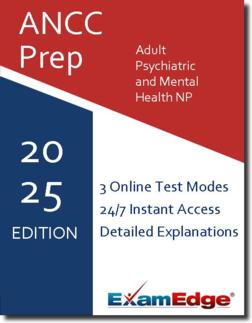ANCC Adult Psychiatric and Mental Health NP (PMHNP) Practice Tests & Test Prep by Exam Edge - Topics
Based on 20 Reviews
- Real Exam Simulation: Timed questions and matching content build comfort for your ANCC Adult Psychiatric and Mental Health NP test day.
- Instant, 24/7 Access: Web-based ANCC Adult Psychiatric and Mental Health NP practice exams with no software needed.
- Clear Explanations: Step-by-step answers and explanations for your ANCC exam to strengthen understanding.
- Boosted Confidence: Reduces anxiety and improves test-taking skills to ace your ANCC Adult Psychiatric and Mental Health NP (PMHNP).

Understanding the exact breakdown of the ANCC Adult Psychiatric and Mental Health NP test will help you know what to expect and how to most effectively prepare. The ANCC Adult Psychiatric and Mental Health NP has multiple-choice questions The exam will be broken down into the sections below:
| ANCC Adult Psychiatric and Mental Health NP Exam Blueprint | ||
|---|---|---|
| Domain Name | % | Number of Questions |
| Foundations for Advanced Practice Nursing | 29% | 29 |
| Professional Role and Policy | 40% | 40 |
| Independent Practice Competencies | 31% | 31 |


